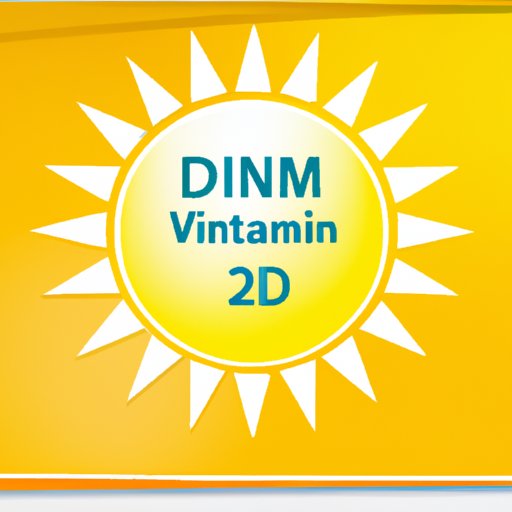Introduction
Vitamin D is an essential nutrient that plays a vital role in many bodily functions. It helps to regulate calcium and phosphorus levels, which are important for maintaining healthy bones and teeth. It also helps to regulate the immune system, aiding in the prevention of certain diseases. Knowing how much vitamin D you need daily is important for optimal health.
Exploring Vitamin D: How Much Do You Need Each Day?
What is Vitamin D? Vitamin D is a fat-soluble vitamin found naturally in some foods and can be synthesized when exposed to sunlight. It is also available as a dietary supplement. Vitamin D helps the body absorb calcium and phosphorus, both important minerals for bone health.
Recommended Daily Allowances: The Institute of Medicine (IOM) recommends different amounts of vitamin D based on age. For infants under 12 months, the IOM suggests 400 IU per day; for children aged 1 to 18 years old, 600 IU per day; for adults aged 19 to 70, 600 IU per day; and for adults over 70, 800 IU per day.
Sources of Vitamin D: Vitamin D can be obtained through food sources such as fortified milk, fatty fish, and egg yolks. Sunlight is another source of vitamin D, however, the amount of vitamin D produced depends on factors such as skin color and the time of day. Supplements are another option for those who do not get enough vitamin D from their diet or exposure to sunlight.
The Benefits of Vitamin D: How Much Should You Take Daily?
Health Benefits of Vitamin D: Vitamin D has been linked to a number of health benefits including reducing the risk of certain cancers, improving bone health, and boosting immunity. It also helps to regulate blood pressure and may reduce the risk of diabetes and other chronic diseases.
Risks Associated with Too Much Vitamin D: Taking too much vitamin D can have serious consequences. High levels of vitamin D can lead to excessive calcium absorption, which can cause kidney stones and other related problems. It is important to consult a healthcare provider before taking any supplements to ensure that the correct dosage is taken.
Vitamin D Intake: What Is the Recommended Daily Amount?
Factors Affecting Vitamin D Needs: Factors such as age, gender, weight, and skin color can affect how much vitamin D is needed. People with darker skin tones require more sun exposure than those with lighter skin tones to produce the same amount of vitamin D.
Recommended Dietary Allowances for Different Age Groups: For infants aged 0 to 12 months, the IOM recommends 400 IU per day; for children aged 1 to 18 years old, 600 IU per day; for adults aged 19 to 70, 600 IU per day; and for adults over 70, 800 IU per day.
Vitamin D Deficiency: What Are the Recommended Daily Allowances?
Symptoms of Vitamin D Deficiency: Symptoms of vitamin D deficiency include tiredness, muscle weakness, depression, and bone pain. Other symptoms can include frequent infections, slow healing, and brittle nails.
Treatments for Vitamin D Deficiency: Treatment for vitamin D deficiency includes dietary changes, increased sun exposure, and supplements. Consulting a healthcare provider is recommended to determine the best course of treatment.
The Sunshine Vitamin: How Much Vitamin D Do You Need?
Sun Exposure and Vitamin D: Sun exposure is one of the best sources of vitamin D. However, it is important to note that too much sun exposure can increase the risk of skin cancer. Therefore, it is important to limit sun exposure and use sunscreen when outdoors.
Vitamin D Supplements: Vitamin D supplements are available in liquid, tablet, or capsule form. They can be taken orally or injected into the body. It is important to speak with a healthcare provider before taking any supplements to ensure that the correct dosage is taken.
Vitamin D for Optimal Health: How Much Do You Need Daily?
Tips for Getting Enough Vitamin D: Eating a balanced diet rich in vitamin D, spending time outdoors in the sun, and taking a vitamin D supplement are all good ways to ensure that you are getting enough vitamin D.
Long-Term Benefits of Maintaining Adequate Vitamin D Levels: Maintaining adequate vitamin D levels is important for overall health. It helps to protect against certain diseases, boosts the immune system, and can help to improve bone health.
Getting Enough Vitamin D: What Is the Recommended Daily Intake?
Food Sources of Vitamin D: Foods such as fatty fish, eggs, and dairy products are all good sources of vitamin D. Some foods are also fortified with vitamin D, such as breakfast cereals and orange juice.
Calculating Your Daily Vitamin D Needs: Calculating your daily vitamin D needs can be done by taking into account your age, skin type, current health, and lifestyle. Consulting a healthcare provider is recommended to ensure that you are getting the right amount of vitamin D.
Conclusion
Vitamin D is an essential nutrient that helps to regulate many bodily functions. Knowing how much vitamin D you need daily is important for optimal health. The IOM suggests different amounts of vitamin D based on age, and there are a variety of sources available to ensure that you are getting enough. Eating a balanced diet, spending time outdoors in the sun, and taking a vitamin D supplement are all good ways to ensure that you are getting enough vitamin D.


